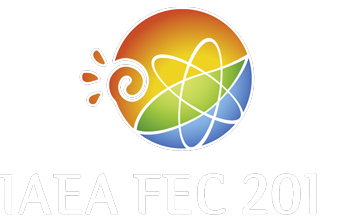Speaker
Dr
Andreas Langenberg
(Max-Planck-Institut für Plasmaphysik,17491 Greifswald, Germany)
Description
Starting from the first operation of the Wendelstein 7-X (W7-X) stellarator, the x-ray imaging crystal spectrometer system (XICS) routinely provides line of sight integrated measurements of electron, Te, and ion temperatures, Ti, as well as Ar impurity densities, nAr, based on the spectral emission of an argon tracer impurity. In addition, XICS is capable to measure plasma flow velocities v that allows the determination of the radial electric field Er as an essential observation for any transport analysis. With a view field covering a wide range of the plasma cross section (Fig.1-a) and a time resolution of up to 5 ms, the temporal evolution of radial plasma parameter profiles has been studied in detail.
For the inference of the actual plasma parameter profiles from line of sight integrated measurements, an entire forward model of the XICS diagnostic has been created using the Minerva Bayesian Analysis framework. Other W7-X profile diagnostics, such as Thomson scattering and ECE, are also being developed within the Minerva framework, which in combination with the Bayesian approach makes it possible to analyze multiple diagnostics simultaneously, increasing accuracy and consistency.
First results on the performance of He and H plasmas at W7-X as well as the reliability of the inversion method will be discussed in detail.
| Country or International Organization | Germany |
|---|---|
| Paper Number | EX/P5-3 |
Author
Dr
Andreas Langenberg
(Max-Planck-Institut für Plasmaphysik,17491 Greifswald, Germany)
Co-authors
Dr
David Gates
(PPPL)
Dr
Jakob Svensson
(Max-Planck-Institut für Plasmaphysik, 17491 Greifswald, Germany)
Dr
Novimir Pablant
(Princeton Plasma Physics Laboratory)
Dr
Oleksandr Marchuk
(Institut für Energie und Klimaforschung-IEK-4, Forschungszentrum Jülich GmbH, 52425 Jülich, Germany)
Mr
Peter Traverso
(Auburn University, Auburn, AL, USA)
Mr
Pranay Valson
(Max-Planck-Institut für Plasmaphysik,17491 Greifswald, Germany)
Prof.
Robert Wolf
(Max-Planck-Institute for Plasma Physics)

